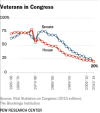One point to make, then I'll lay off the threadjack.Yeah, except life expectancy is more like 83 not 73. They may not pay YOU for 40 years, but on average they're paying everyone for 40 years. Using a 7% discount rate is inaccurate. It's a federal government security, not common stock and therefore "risk free" ( except when it's not). An accurate discount rate is the historical 30 year Treasury, which is about 3.5%. You would also want to value it at the day you retire, the day it starts paying out.
For the discount rate, you would only use the risk-free rate if you were only allowed to invest in risk-free assets. Most of the time, the average return of the stock market (usually the S&P 500) is used as a proxy for the discount rate, since that's what people usually invest their money in. Obviously, if your investing behavior is different, you'd have to adjust it. But going back to the previous example, my pension is worth $125k to me today because if they just gave me that lump sum, and I invested it and got that return, I could basically make my own pension of the exact same payments. As for how it applies to the government cost, I'm really not sure, since I don't know how they handle their float, but they'd be idiots to invest it solely in risk-free Treasuries. Which I realize could be the case.
EDIT: Go figure - "The Secretary shall immediately invest in interest-bearing securities of the United States such currently available portions of the Fund as are not immediately required for payments from the [Civil Service Retirement and Disability] Fund."
Last edited:




